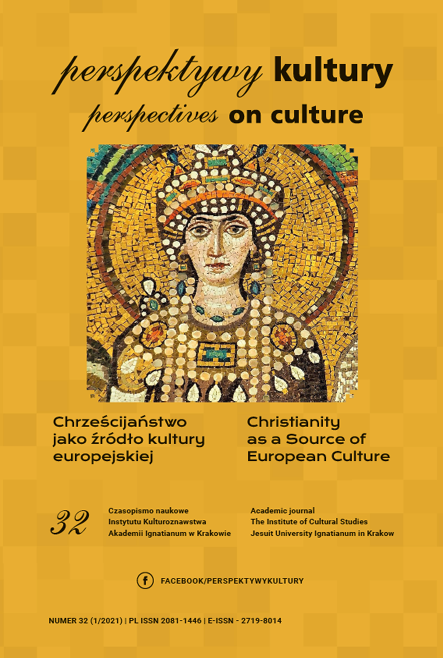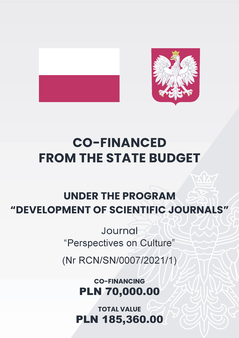Cross-Cultural Competence of Students from Selected European Union Countries (Poland, Spain, Czech Republic, Italy).
Preliminary Assumptions of the Research Project
Abstract
The changes taking place in the contemporary labour market were the factor that prompted our project. The employee’s position on this market does not depend only on his specialist knowledge and professional qualifications. This is particularly important in a multicultural environment, in which even linguistic competences are losing their significance because – without the ability to adapt to new cultural conditions – they do not play a major role. Cultural diversity becomes a source of competitive advantage at the moment when a company adopts appropriate strategies and techniques, which is the task faced by, among others, modern managers. The aim of the project is to explore the role of cross-cultural competence as an important element of university education from the point of view of both: educational programmes and the labour market. It is now believed that cross-cultural competence, understood as an attitude towards cooperation with representatives of other cultures, is a very important element of university education in the process of preparing students to successfully function on the global labour market. The level of interpersonal skills of individual members of a multicultural team (especially the level of their cultural intelligence) which enables them to effectively cooperate with representatives of other cultures is one of the main elements of cross-cultural competence. On the basis of the results of the study, the theories of management science will be elaborated on, taking into account international realities and emphasising the importance of cross-cultural competence on the labour market. The results of the project will support the development of management science, especially in the field of intercultural management, by indicating how existing management theories are based on and benefit from practice, and how they are interpreted in management practice. Thanks to the study, both theoreticians and practitioners of management will be able to obtain more knowledge about cross-cultural competence.
References
Bean, R. (2006). The effectiveness of cross-cultural training in the Australian context. Canberra: Department of Immigration and Multicultural Affairs.
Burkiewicz, Ł. & Knap-Stefaniuk, A. (2018). Intercultural management as a challenge for modern managers – development of potential of multicultural teams. Zeszyty Naukowe Politechniki Śląskiej. Seria Organizacja i Zarządzanie, 130, 61–69.
Burkiewicz, Ł. & Knap-Stefaniuk, A. (2020a). Management by values in work of international managers. Zeszyty Naukowe Politechniki Śląskiej. Seria Organizacja i Zarządzanie, 149, 47–56.
Burkiewicz, Ł. & Knap-Stefaniuk, A. (2020b). Modern Managers and Cultural Diversity in The Workplace. In K. Soliman (ed.), Education excellence and innovation management: a 2025. Vision to sustain economic development during global challenges. Sevilla–New York: International Business Information Management Association, 7474–7483.
Chen, G.M. & Starosta, W.J. (1997). A review of the concept of intercultural sensitivity. Human Communication, 1, 1–16.
Chen, G.M. & Starosta, W.J. (1998). A review of the concept of intercultural awareness. Human Communication, 2, 27–54.
Chen, G.M. & Starosta, W.J. (2000). The development and validation of the Intercultural Sensitivity Scale. Human Communication, 3, 1–15.
Cox, T.H. & Blake, S. (1991). Managing Cultural Diversity: Implications for Organizational Competitiveness. The Executive, Vol. 5, No. 3: 47.
Graf, A. (2004). Assessing intercultural training designs. Journal of European Industrial Training, 28(2/3/4), 199–214.
Hofstede, G. (2001). Culture Consequences. Comparing Values, Behaviors, Institutions and Organizations Across Nations. Thousand Oaks–London–New Delhi: Sage Publications.
Hofstede, G., Hofstede, G.J. & Minkow, M. (2010). Cultures and Organizations. Software of the Mind. Intercultural Cooperation and Its Importance for Survival. New York: McGraw-Hill.
Ilie, O.A. (2019). The intercultural competence. Developing effective intercultural communication skills. International Conference Knowledge-based organization, Vol. XXV, No. 2, 264–268.
Inglehart, R. (1997). Modernization and Postmodernization. Cultural, Economic and Political Change in 43 Societies. New Jersey-Princeton: Princeton University Press.
Knap-Stefaniuk, A. (2020). The Importance of Cultural Intelligence in International Human Resource Management – A Pilot Study. In K. Soliman (ed.), Education excellence and innovation management: a 2025 Vision to sustain economic development during global challenges. Sevilla–New York: International Business Information Management Association, 7995–7836.
Knap-Stefaniuk, A. & Burkiewicz, Ł. (2018). Contemporary Leadership in the Conditions of Multiculturalism – Challenges for Human Resources Management. Scientia et Societas, 2/18, 113–122.
Knap-Stefaniuk, A. & Burkiewicz, Ł. (2019a). Contemporary Managers in Intercultural Management. Przedsiębiorczość i Zarządzanie, 20(6) (3), 63–75.
Knap-Stefaniuk, A. & Burkiewicz, Ł. (2019b). Multiculturalism as a Source of Conflicts in Contemporary Organizations. Przedsiębiorczość i Zarządzanie, 20(11), 97–106.
Knap-Stefaniuk, A. & Burkiewicz, Ł. (2020a). Cultural diversity of employees as a challenge at the work of international managers. In B. Domańska-Szaruga & E. Bombiak (eds.), Współczesne wyzwania w zarządzaniu zasobami ludzkimi. Siedlce: Wydawnictwo Uniwersytetu Przyrodniczo-Humanistycznego w Siedlcach, 49–61.
Knap-Stefaniuk, A. & Burkiewicz, Ł. (2020b). Modern managers’ values in a multicultural environment – an introduction to an in-depth study. In K. Soliman (ed.), Education excellence and innovation management: a 2025. Vision to sustain economic development during global challenges. Sevilla– New York: International Business Information Management Association, 1022–1034.
Morgan, G. (1989). Endangered Species: New Ideas. Business Month, Vol. 133, No. 4, 75–77.
Muszyńska, J., Danilewicz, W., & Bajkowski, T. (eds.) (2013). Kompetencje międzykulturowe jako kapitał społeczności wielokulturowych. Warszawa: Wydawnictwo Akademickie Żak.
Nikitorowicz, J. (2009). Edukacja regionalna i międzykulturowa. Warszawa: Wydawnictwa Akademickie i Profesjonalne.
Ochieng, E.G. & Price, A.D. (2009). Framework for managing multicultural project teams. Engineering, Construction and Architectural Management, Vol. 16, No. 6, 527–543.
Report prepared by Association of Business Service Leaders in Poland [Raport przygotowany przez Związek Liderów Sektora Usług Biznesowych] (2019). Sektor nowoczesnych usług biznesowych w Polsce 2019. Warszawa: Wydawnictwo ABSL.
Suchocka, A. (2016). Kompetencje międzykulturowe – przywilej czy konieczność? Colloquium Wydziału Nauk Humanistycznych i Społecznych. Kwartalnik, 4/201, 121–131.
Trompenaars, F. & Hampden-Turnera, Ch. (1997). Riding The Waves of Culture: Understanding Diversity in Global Business. New York: Nicholas Brealey Publishing.
Copyright (c) 2021 Jesuit University Ignatianum in Krakow

This work is licensed under a Creative Commons Attribution-NoDerivatives 4.0 International License.
Autor, zgłaszając swój artykuł, wyraża zgodę na korzystanie przez Wydawnictwo Uniwersystet Ignatianum z utworu na następujących polach eksploatacji:
- utrwalania utworu w formie papierowej, a także na nośniku cyfrowym lub magnetycznym;
- zwielokrotnienia utworu dowolną techniką, bez ograniczenia ilości wydań i liczby egzemplarzy;
- rozpowszechniania utworu i jego zwielokrotnionych egzemplarzy na jakimkolwiek nośniku, w tym wprowadzenia do obrotu, sprzedaży, użyczenia, najmu;
- wprowadzenia utworu do pamięci komputera;
- rozpowszechniania utworu w sieciach informatycznych, w tym w sieci Internet;
- publicznego wykonania, wystawienia, wyświetlenia, odtworzenia oraz nadawania i reemitowania, a także publicznego udostępniania utworu w taki sposób, aby każdy mógł mieć do niego dostęp w miejscu i czasie przez siebie wybranym.
Wydawca zobowiązuje się szanować osobiste prawa autorskie do utworu.






